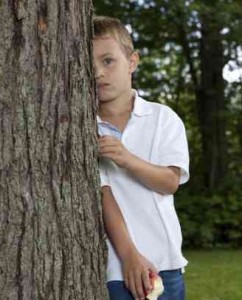Children and young adults whom have an excessive fear of social situations such as giving a speech, going for an interview or even eating in front of a group are commonly diagnosed as having Social Anxiety Disorder.

With this type of disorder, children have such a high level of fear that they will embarrass themselves that they often just avoid any situation that may set off the trigger. In the long term this can hamper emotional growth and keep your child from reaching their full potential. Some children and young adults are naturally shy, and that is nothing to worry about. If they still engage in normal activity and seem to enjoy school and activities, but are just quiet and stay in the background – there is usually not a concern. Children who have anxiety about social settings show an array of symptoms for a duration of time and often will request to not go to school, not be with other children and steer away from group activities.
What are the signs of Social Anxiety Disorder?
There are a few criteria that are typically looked for when diagnosing Social Anxiety Disorders in children. If you bring your child to a Child Psychologist, they will look for symptoms that are emotional, physical and/or behavioral. Below are just some of the many signs that are looked for when making a diagnosis.
Emotional Symptoms
- A fear of embarrassing themselves
- Constant worry about being judged by others
- Intense worry or stress about an upcoming group event
Behavioral Symptoms
- Hiding in the background in social situations
- Avoiding social situations entirely
- Lack of participation in group programs and events
- Clinging to parents
Physical Symptoms
- Tightness of chest and shortness of breath
- Vomiting or upset stomach
- Feelings of dizziness
- Shaking
Social Anxiety Disorder Treatment
If you utilize the services of a child psychologist to help understand the level of anxiety your child has and to get them treatment, your psychologist might recommend a few types of treatment. Two popular treatments for anxiety in children include Cognitive Behavioral Therapy and Group Therapy. Both offer your child the tools needed to conquer their fear and to manage anxiety to be able to better focus and achieve their goals. If you feel you need some help in treating your child’s Social Anxiety Disorder, or want to learn more about what to look for to determine if your child has this disorder, it may be best to contact a child psychologist.





